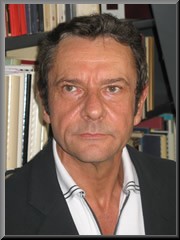|
CURRICULUM VITAE
Virginio Marzocchi (Roma, 1951) has taught at the Universities of Giessen and Kassel; since 1985 he has been researcher and in 2001 he got tenured as a professor of Political Philosophy and Human Rights in the Faculty of Philosophy of “Sapienza” University of Rome. Then, he has taught History of Political Philosophy and he is currently professor of Political and Social Philosophy. He is the Director of the PhD Programme of his Faculty.
He has been editor of works by German authors (E. Bloch, Marxismo e utopia, Editori Riuniti 1984; K.-O. Apel, Discorso, verità, responsabilità, Guerini 1997). Besides a vast series of articles on contemporary German philosophy and the current ethical-political debate, he has published the following works: Per un’etica pubblica. Giustificare la democrazia (Liguori 2000), Ragione come discorso pubblico. La trasformazione della filosofia di K.-O. Apel (Liguori 2001), Le ragioni dei diritti umani (Liguori 2004). Along with S. Petrucciani, he has edited the book Democrazia e diritti nell’età globale (Manifestolibri, 2004).
He is now focusing, in particular, on the twentieth-century linguistic turn and on the theory of state and democracy, from a critical-deliberative point of view.
In his recent works he takes up and strengthens the inheritance of the discursive paradigm, so as to fully analyse the connection between the linguistic turn (in its historical passages) and the justufication of the Diskursethik, on which firsty Apel shed light. On this base, in Le ragioni dei diritti umani he elaborates a particular theory of democracy, closely linked to the core of his theory of knowledge and language: starting from an analysis of the developments and the outcomes of the linguistic turn, he argues for a reconfiguration of the concept of fundamental rights, against the traditional conception of rights (shared above all by liberal thinkers) which considers them to shield individuals from public powers. He provides a theory based on a virtuous circle between three complementary elements: law (as a functional medium for complex societies to be efficiently integrated), rights (as spaces of liberties, within which interlocutors can elaborate requirements as well as experience elective forms of relation), and democracy (i.e. the formal procedures which should be aimed both at making addressees of laws authors of them and at producing the resources indispensable to make public institutions work).
For contacts:
Dipartimento di Studi Filosofici ed Epistemologici
Universitą di Roma "La Sapienza"
Via C. Fea 2
00152 Roma
virginio.marzocchi@uniroma1.it
|
